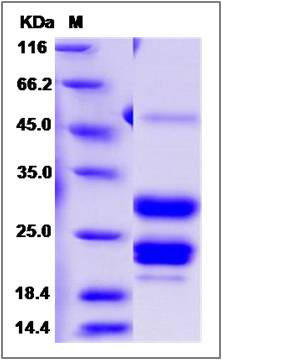Human AGA / ASRG / Aspartylglucosaminidase Protein (His Tag)
AGU,ASRG,GA
- 100ug (NPP1874) Please inquiry
| Catalog Number | P13705-H08H |
|---|---|
| Organism Species | Human |
| Host | Human Cells |
| Synonyms | AGU,ASRG,GA |
| Molecular Weight | The recombinant human AGA comprises 334 amino acids and has a predicted molecular mass of 36.1 kDa. The apparent molecular mass of the protein is approximately 47, 29, 23 and 20 kDa in SDS-PAGE under reducing conditions due to glycosylation. |
| predicted N | Ser 24 |
| SDS-PAGE |  |
| Purity | (5.2+44.1+46.8+3.4) % as determined by SDS-PAGE |
| Protein Construction | A DNA sequence encoding the human AGA (CAA39029.1) (Met1-Ile346) was expressed with a C-terminal polyhistidine tag. |
| Bio-activity | |
| Research Area | |
| Formulation | Lyophilized from sterile PBS, pH 7.4. 1. Normally 5 % - 8 % trehalose and mannitol are added as protectants before lyophilization. Specific concentrations are included in the hardcopy of COA. |
| Background | S100 protein is a family of low molecular weight protein found in vertebrates characterized by two EF-hand calcium-binding motifs. There are at least 21 different S100 proteins, and the name is derived from the fact that the protein is 100% soluble in ammonium sulfate at neutral pH. Most S100 proteins are disulfide-linked homodimer, and is normally present in cells derived from the neural crest, chondrocytes, macrophages, dendritic cells, etc. S100 proteins have been implicated in a variety of intracellular and extracellular functions. They are involved in regulation of protein phosphorylation, transcription factors, the dynamics of cytoskeleton constituents, enzyme activities, cell growth and differentiation, and the inflammatory response. |
| Reference |
